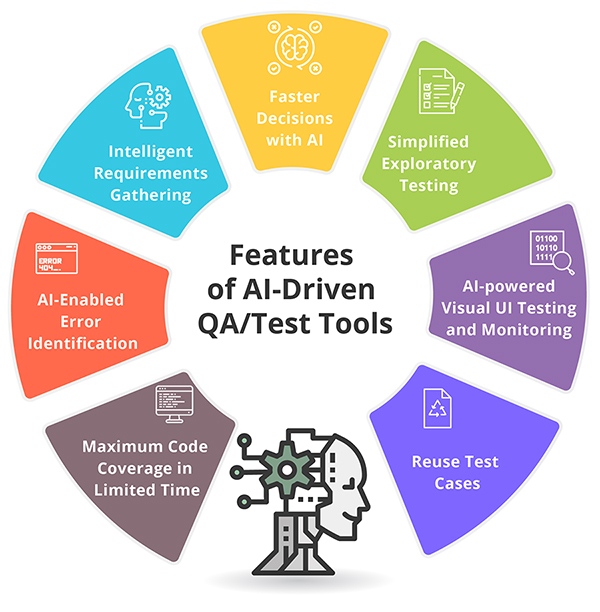How Is AI Helpful For Software Testing?
How is AI helpful for software testing? The world of software testing has been changing in recent years. With the rise of DevOps (developers being responsible for quality assurance), QA teams have had to redefine their roles and find ways to automate manual processes. Automation has always been an important part of software testing—we've automated unit tests, integration tests, and user acceptance tests using third-party tools or scripting languages like Python or R—but now we can take automation even further with artificial intelligence (AI).
In this post, I'll explore some examples of how AI can be used in software testing today and what kinds of tasks it could help us with in future projects. We'll also look at some limitations that currently exist with applying AI technologies to test automation today.
Artificial Intelligence is now a part of our daily lives.
AI is now a part of our daily lives. It's being used by many companies and industries, from healthcare to finance and retail. AI is also used in software testing, which means it can be found in many areas of software testing:
- Test Case Generation - AI helps generate test cases based on user requirements and business goals
- Data Driven Testing - AI can analyze data to determine if a change has been made correctly or not
- Automated Bug Reporting - In some cases, automated bug reporting tools like HPE Fortify produce so much information that it would take hours for humans to read through it. Instead of having people manually go through all this data, they use algorithms developed by machine learning models (ML), which allow them to quickly identify anomalies without reading every single line of code.
It can be used as an asset in software testing.
AI can be used as an asset in software testing. AI is a tool that automates manual testing processes, so it's not limited to just one environment or type of testing. It can help you identify anomalies in the test environment, take control of it, and even predict possible outcomes based on past experiences.
AI can be used for both black box and white box environments because it doesn't require any specific skillset or knowledge to use; however, some prerequisites need to be met before you begin using this technology:
It has the potential to automate manual testing processes.
AI has the potential to automate manual testing processes. It can help automate tasks like test case writing and management. The more data collected and analyzed, the better it becomes at automatically performing some tasks in your software testing tool.
AI also impacts how you structure your automation efforts by giving you access to enormous new data that can be used for decision-making or informed predictions about what will happen next in a test execution scenario (or even with other users).
AI can detect issues that may arise in the future using predictive modeling.
Using predictive modeling, AI can detect issues that may arise in the future. For example, if users have reported a bug and there are no errors on the page, then AI will predict the most likely cause of this issue. This helps developers find bugs at an early stage and fix them before they affect users' experience with the product.
AI is also helpful in predicting the most likely time when a certain type of problem might occur. For example: if you're experiencing slow performance on your website today (1 pm), it could indicate that something is wrong with your server or database server--and it would be good to know about this now so you can take action before things get worse!
It can be used for both black and white box environments.
AI can be used for both black-box and white-box testing. It can also be used as a checker or as a tester itself.
AI can be used to test the code or product, environment or product, and system or product in both environments.
It can easily identify and control anomalies in the test environment.
AI can detect anomalies in the test environment and take control of that environment. This can be helpful for testers when they're looking for bugs or issues in their applications. AI can also automate manual testing processes, which is an especially useful tool for companies with a lot of manual testing work.
For example: if you have an app that runs on multiple devices, like iOS, Android, and Windows phones -- each one will have different requirements for its device type (screen size/resolution). With AI-powered automation tools like Selenium Webdriver or Appium (or any other popular framework), you don't have to worry about manually writing code because these tools will do all this work for you automatically!
AI is a helpful technology for software testing; software testers should learn about it.
AI is a helpful technology for software testing; software testers should learn about it.
It can be used to automate manual testing processes, detect issues that may arise in the future using predictive modeling, or even automatically generate test cases based on the requirements provided by the client. In short, AI offers many opportunities for improving your work as a tester!
Conclusion
We hope this article has given you a better understanding of the role of AI in software testing. As more companies recognize the benefits of artificial intelligence, we expect to see even more innovative uses in this field.





Great information, Thanks for sharing this important informative article Oracle Fusion SCM Training
ReplyDeleteA very good and useful post. Oracle Fusion Financials Training
ReplyDeleteI had been looking for such information for quite some time. Thank you for posting. . Oracle Fusion HCM Training
ReplyDelete